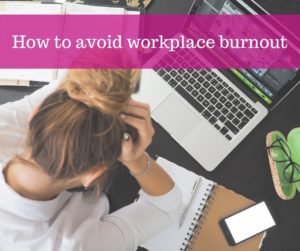
We’ve just reached two-thirds of the way through 2019 and if you’re yet to have a nice holiday or any time off, you’re probably starting to feel overwhelmed, tired, emotionally drained and unable to meet constant demands.
With more people working longer hours than ever, feeling stressed about work is extremely common. In fact, the World Health Organisation has recently deemed burnout as a workplace phenomenon.
Work burnout is a state of physical, emotional and mental exhaustion that also involves feelings of reduced accomplishment. It is caused by excessive and prolonged work related stress and can lead to anxiety and depression.
If you’re wondering, “am I suffering from workplace burnout?” ask yourself if you’re experiencing any of the following:
• Feeling exhausted all the time
• Continuing to get into work late or leaving early
• Becoming cynical or critical at work
• Becoming easily irritated or impatient with co-workers or clients
• Lacking the desire or motivation to complete tasks
• Lack of satisfaction after completing tasks
• Reduced efficiency and increased errors
• Physical symptoms including headaches, stomach pains or being sick more frequently
Lucky there are some ways to help your workplace burnout, and prevent future episodes. Here are 5 easy tips:
Exercise – Exercise is crucial to our mental and physical health. When we exercise our brain produces endorphins, which are our body’s natural painkiller and mood-elevating hormones. These hormones are responsible for feeling calmer, happier and able to think more clearly after a workout.
Exercise also reduces the levels of cortisol and adrenaline, which are the body’s stress hormones. It has been found that running for just 15 minutes a day reduces the risk of depression by 26%.
Sleep – Getting the recommended 7-9 hours of sleep each night is crucial to our health and happiness. Stress raises cortisol levels, a hormone that stimulates alertness. Cortisol levels are meant to fall in the evening to prepare us for sleep but when we’re stressed these levels remain high, causing us to feel more awake and unable to switch off at nighttime. A poor nights sleep can affect memory, judgment and mood.
Start saying no – Don’t be afraid to set boundaries at work. It’s impossible to do everything and be everywhere. Saying no will help you stay engaged and excited about your work so choose tasks that are most important to you or the most necessary and just stick to those.
Social support – When we are feeling overwhelmed or stressed there is a natural tendency to disconnect from others and isolate ourselves. However being surrounded by people who are caring and supportive helps you to deal better with stressors. Studies have found that mood can improve when you talk about your problems, as finding others who are going through something similar to you can offer support, empathy and even motivation. Isolation and suppressing emotions can cause bad moods and lead to depression.
Mindfulness – When you’re burnt-out you may find that you have reoccurring thoughts, feel irritable and lack concentration. Mindfulness can help to tune out distractions and improve our ability to focus, leading to improved memory and mental performance. Studies have shown that daily mindfulness can lead to a reduction in stress and improvements in mood, focus, quality of sleep, self-efficacy and self-compassion. Not only can mindfulness help the mind to cope better with stressors, studies have also shown it can help decrease blood cortisol levels and blood pressure, suggesting it can positively influence our physical health too.
Burnout can creep up on you, so make sure you’re regularly checking in with your feelings and emotions. If you’re feeling like you could be more stressed than usual, put on your shoes and go for a walk, get to bed earlier, or go out and meet up with friend you haven’t seen in a while. Your body and your mind will thank you for it later.



